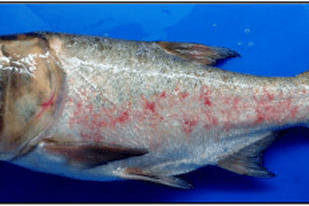Plesiomonas shigelloides is a Gram-negative bacterium found in freshwater and estuarine environments. It is an opportunistic pathogen that can cause gastrointestinal infections in fish and humans. In fish, infections may lead to hemorrhages, skin ulcers, and septicemia. Human infections are often linked to the consumption of contaminated water or seafood, leading to diarrhea and gastrointestinal distress.
Distribution: Worldwide in freshwater and estuarine environments.
Hosts: Fish, amphibians, and humans.
Detection Methods: Bacterial culture – TSA (tryptic soy agar).
Target Tissue: Intestines and systemic infection.

We help identify and prevent fish diseases, supporting sustainable aquaculture and healthy ecosystems.
Follow us
©Copyright 2025 | Powered by Fish Disease Org | Associated with Kentucky State University
Designed & Developed by Achieve Digital & Webgen Technologies
Get a personalized walkthrough of our platform and learn how to use our pathogen database, image galleries, and diagnostic tools effectively.